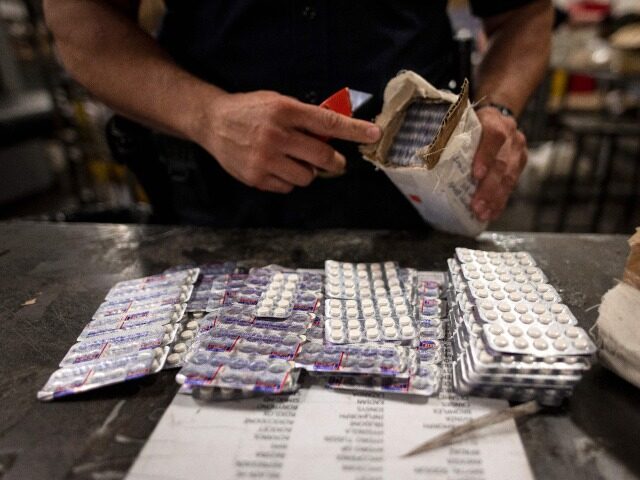A blockchain analytics firm called Chainalysis estimated on Wednesday that suspected producers of the lethal drug fentanyl, largely located in China, have collected some $38 million in payments using cryptocurrency since 2018.
The Chainalysis report, entitled “Crypto and the Opioid Crisis: What Blockchain Analysis Reveals About Global Fentanyl Sales,” noted that China “has been home to the largest chemical industry by revenue in the world since 2011” and was cited by the U.S. Drug Enforcement Administration (DEA) as the largest producer of precursor chemicals for fentanyl in 2019.
India is another “heavy producer” of fentanyl precursors, and Chainalysis acknowledged that some of this chemical production is sold to entirely legitimate pharmaceutical enterprises, but the DEA has grown adept at spotting patterns of shipments to drug traffickers.
“The DEA has noted a pattern of fentanyl production in which precursor chemicals are illegally shipped to Latin America, where they are used to manufacture fentanyl, which is then transported into the U.S. to be sold,” the report said.
With this in mind, Chainalysis tracked down cryptocurrency addresses linked to suspected Chinese manufacturers of fentanyl precursor chemicals and found $37.8 million worth of crypto flowing to them, largely emanating from Latin America, North America, Europe, and Asia.
Researchers then matched these crypto payments with fentanyl seizures along the U.S.-Mexico border and found that “cryptocurrency-based transactions associated with fentanyl production match regional patterns previously identified by the DEA.”
Stated simply, those patterns involved large seizures of fentanyl at the border right after cryptocurrency transactions surged between Mexico and Chinese chemical companies. Chainalysis observed that darknet operators have taken to banning fentanyl because they fear the unwanted attention it brings to their marketplaces from law enforcement — but fentanyl dealers have easily bypassed these bans by coming up with euphemisms like “China White” for their products.
Chainalysis recalled several notable cases of cryptocurrency financing fentanyl and other drugs, including a Dutch-British network busted in 2022 that used an incredibly complicated chain of crypto transactions and darknet sales to conceal over $30 million in revenue. This network even used cryptocurrency to pay for postage when it shipped its illicit goods.
A case that broke last month involving Chinese companies was especially relevant to Chainalysis’s findings:
More recently, on April 14, 2023, OFAC and the DOJ sanctioned and charged individuals and entities who used cryptocurrency addresses to sell illicit fentanyl and other synthetic drugs. Wuhan Shuokang Biological Technology (WSBT) and Suzhou Xiaoli Pharmatech (SXPC) are two of these organizations. Based in China, these two chemical labs sold fentanyl precursors to brokers in Latin America, who sold them to drug cartels in Mexico. The drug cartels then created fentanyl products and shipped them into the U.S.
WSBT and SXPC both accepted Bitcoin for purchases. One address belonging to an associate of WSBT received approximately $366,000 in Bitcoin as part of these transactions, most of which was sent from mainstream exchanges and the now-sanctioned darknet market Hydra.
The Hydra Market was regarded as “the world’s largest and longest-running darknet market” when the U.S. Department of Justice (DOJ) shut it down in April 2022. The servers were holding about $25 million worth of cryptocurrency when they were seized. The DOJ estimated the market moved $5.2 billion in cryptocurrency transactions over the previous seven years.
The DOJ described Hydra as “an online criminal marketplace that enabled users in mainly Russian-speaking countries to buy and sell illicit goods and services, including illegal drugs, stolen financial information, fraudulent identification documents, and money laundering and mixing services.”
The South China Morning Post (SCMP) reported on Wednesday that another blockchain analytics firm, London-based Elliptic, performed an analysis of cryptocurrency transactions that produced conclusions similar to those of Chainalysis. Elliptic researchers said they found over 90 Chinese chemical firms that were willing to sell fentanyl precursors in exchange for crypto payments.
The SCMP said:
The cryptocurrency wallets used by these companies have received thousands of payments over the past few years, totalling more than US $27 million, according to the firm. The most popular crypto token accepted by these suppliers is bitcoin, followed by the stablecoin Tether.
Elliptic found this crypto-financed chemical trade all the more remarkable because the authoritarian Chinese government has effectively banned cryptocurrency transactions. Chinese officials constantly insist their companies have nothing to do with the fentanyl trade, despite copious evidence to the contrary.

COMMENTS
Please let us know if you're having issues with commenting.